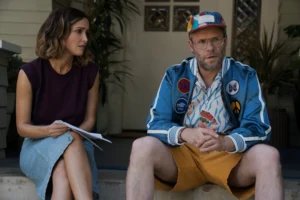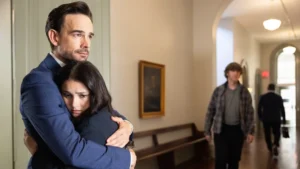Summary
The Nest is perhaps the first COVID-19/quarantine film without meaning to be. Its levels of isolation are deeply felt and highlighted by the lies we tell to ourselves or the ones whom we hold most dear.
Director Sean Durkin stated in an interview when he makes a film he explores things that scare him so he can confront them. His debut film, Martha Marcy May Marlene, is a deep exploration of a wide range of emotions (being deprogrammed, controlled, exploited, and psychologically abused) that are a result of a young woman seeking unity and community because of traumatic isolation that their perceived individuality has cost them. In his follow-up, The Nest, he takes up the prospect of isolation again. This is not just being physically uprooted from family, friends, and sense of community, but from even the ones we hold most dear even if we are in their vicinity. There is emotional isolation that is created when the lies are told and the truth is held back. It can be as psychologically harmful as physical abuse.
That’s what’s at the heart of Durkin’s script, a film that is a haunting exploration of physical and emotional isolation. The Nest is a nearly pitch-perfect film experience in terms of tone, score, and lead performances. In a turn that shouldn’t be forgotten, but I’m certain will be with the ridiculously extended Oscar deadline, Carrie Coon gives one of the year’s very best performances. She plays Allison, a horse trainer, and wife of a yuppy businessman named Rory (Jude Law, terrific here). To her dismay, he tells her that his old boss needs him to come back and the opportunity is too good to pass up. So he uproots his wife and kids (Oona Roche and Charlie Shotwell) to England. He then settles them into an English countryside manor. They have no friends, no family, and are isolated from seemingly the rest of the world.
Durkin’s film has a haunting feel and is magnificently cohesive in tone. You never quite lose the anticipation that these characters are going to crack or spin-off their axis at any moment. Coon’s Allison is emotionally closed off from her husband after he discovers his constant lies and manipulation. This causes an almost behavioral depolarization of self-discovery that is almost akin to the character of Nora Helmer of The Dollhouse. Rory coddles, pampers, and patronizes her and uses her purely for show as a beautiful blonde woman at business functions. She comes to realize the ties that the “male” breadwinner money has on her no longer bind.
Sean Durkin’s The Nest premiered at this year’s Sundance, pre-pandemic shutdown in the United States. It is, perhaps, the first COVID-19/quarantine film without meaning to be or knowing it. Its levels of isolation are deeply felt and highlighted by the lies that are told to ourselves or the ones whom we hold dear. By the end of the film, while it lacks a certain punch, it does offer closure as it becomes clear what the real business we should all being invested in — family.



